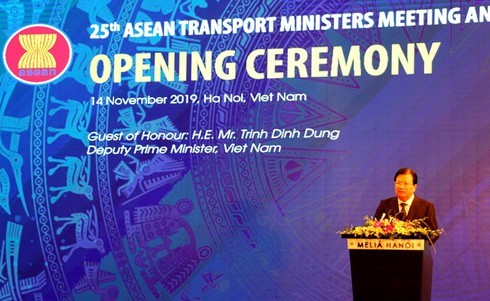 |
|
Deputy Prime Minister Trinh Dinh Dung gives a speech at the event
|
In his opening address, Deputy Prime Minister Trinh Dinh Dung emphasized that the Association of Southeast Asian Nations (ASEAN) has developed into one of the world’s most successful regional organisations.
With a combined population of over 640 million people and the scale of economy reaching approximately US$3,000 billion last year, ASEAN boasts the third largest economy in Asia, and the sixth largest globally.
Deputy PM Dung said that on economics, ASEAN countries have made great strides, with the ASEAN Economic Community in particular able to claim numerous important achievements, adding that the bloc has always considered connectivity and integration a top priority when implementing measures to realise the ASEAN Economic Community.
He laid stress on the importance of strengthening connectivity within the group’s transportation system and the need to build a more dynamic economic region.
In recent times, Vietnam has also focused on developing transport infrastructure in a bid to enhance links among different regions of the country and internationally. This is attributable to the fact that the country is situated in an ideal transport hub that connects Southeast Asia, Northeast Asia, and other regions throughout the Asia–Pacific region.
Deputy PM Dung noted that 2020 marks the 25-year journey of Vietnam becoming a member of the ‘ASEAN family’, in addition to the year that the country officially assumes the position of ASEAN Chair 2020.
During the process of joining the bloc, the nation has grown into an active and responsible member that always looks to work with other member states as a means of reinforcing solidarity, developing a stronger ASEAN, and successfully building a better ASEAN Community.
As the ASEAN Chair 2020, the country commits to making a substantial contribution to developing a coherent and proactive ASEAN Community to create a more peaceful, stable, and prosperous region.
Within the context of Industry 4.0 and the impending impact of climate change, the Deputy PM has requested that the ASEAN Transport Ministers propose new orientations and mechanisms towards enhancing "digital connectivity”, he said.
This includes sharing more data in transportation activities and taking full advantage of scientific and technological advancements to improve the efficiency of transportation links.
It is imperative to build better infrastructure, speed up regional connectivity, ensure more efficiency throughout the ASEAN region, and improve the overall quality of human resources, Dung stressed.
The representative from the Ministry of Transport held that the ATM 25 and the ATM with dialogue partners is held on a rotating basis among member states.
The ATM 25 and ATM with dialogue partners aim to build an inter-connected, effective, safe, and sustainable transportation system within the bloc, therefore helping to form a stable, prosperous, and highly competitive economic area over the next year.
The bloc’s major agendas include the signing of government-level multilateral agreements, the adoption of action plans for the coming years, discussions on measures to deal with challenges that ASEAN faces, and ways of stepping up transportation collaboration with dialogue partners, such as China, Japan, and the Republic of Korea. VOV

ASEAN senior transport officials meeting launched
ASEAN member countries have made remarkable efforts to set up safe, effective and sustainable transport systems in the ASEAN region and between ASEAN and other regions.
 The plenary session of the 25th ASEAN Transport Ministers’ Meeting (ATM 25) and the ATM with dialogue partners, officially opened in Hanoi on November 14.
The plenary session of the 25th ASEAN Transport Ministers’ Meeting (ATM 25) and the ATM with dialogue partners, officially opened in Hanoi on November 14.